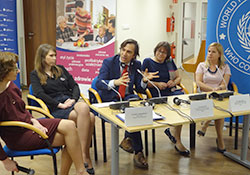WHO supports Poland in fighting childhood obesity

WHO
Overweight roughly affects one fifth of Polish girls and almost one third of boys. Childhood obesity is a matter of health concern in itself, being a risk factor for a number of adverse physical and psychosocial health outcomes in childhood and along the life-course. It will increase the demand for paediatric treatment of a series of ill-health conditions, and will almost certainly lead to a rise in adult obesity rates.
In order to support Poland in halting the rise of childhood obesity, WHO/Europe carried out an analysis in cooperation with national experts to summarize the latest evidence. The review highlighted experiences from other countries and evaluated the policy environment in Poland in order to identify possible effective measures adapted to the national context. The work resulted in a comprehensive report that will facilitate the development of a national action plan or roadmap, but can also serve as a source of inspiration for other countries who are willing to scale up action against childhood obesity in different settings.
Solid evidence to inform policy options has been provided by data collected via the Childhood Obesity Surveillance Initiative (COSI) in Poland, which has just been finalized. COSI is a robust monitoring system using standardized measurements across 40 participating countries in Europe. It has collected anthropometric data on nationally representative samples of children aged 6–9 years since 2007. Poland joined the fourth implementation round in 2016 by collecting a comprehensive set of data on 8 year-old children. The survey was implemented by the Mother and Child Institute. Poland is the only country that measured blood pressure, as well as weight, height and hip circumference. Data showed that roughly 1 in 4 Polish children is either overweight or obese, and 1 in 10 has blood pressure considered unhealthy for their age.
The problem of obesity becomes more significant in older ages and among those children who are living in families of lower socioeconomic background. A report presenting the socioeconomic inequalities and the latest trends in obesity, eating behaviours and physical activity – based on the Health Behaviour in School-aged Children (HBSC) studies done between 2002 and 2014 – was also released at the same time as preliminary COSI results. The report revealed a significant increase in obesity among Polish adolescents in all age groups and in both genders, with higher prevalence rates in adolescents of the lowest affluence families.
The 3 reports were launched together at a conference organized on 24 May 2016 by the WHO Country Office and the Ministry of Health and hosted by the Mother and Child Institute, which is the coordinating institution both for COSI and HBSC in Poland.



